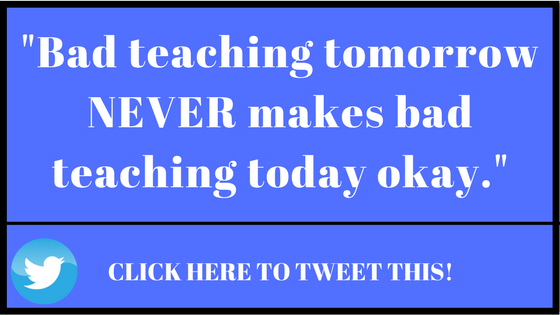Seriously…knock it off.
Ok…so this is going to make a few of you mad and I don’t want to lecture you (haha…see what I did there?) but this needs to be said. In a recent workshop, I had an educator ask me: “I don’t know if I can do this. If I don’t lecture, how will my students learn anything?”
While there are many things wrong with this statement, the thing that bothered me most is how helpless this educator’s students apparently were. This statement assumes that every single student is 100% dependent on the magical words that fill his engaging, life changing lectures, and that no possible learning can take place without these words. Not only is this premise completely ridiculous…it’s also wrong.
Why You Suck At Lecturing…
I’m not talking about you specifically, because you might be great at lecturing students, but according to research, as well as just common knowledge, everyone sort of sucks at lecturing. It has nothing to do with the teacher, but more to do with the fact that…here it comes…lecturing doesn’t work…it kind of sucks.
To most students, it only takes about 15 minutes for that awesome lecture you worked so hard on, to become the equivalent of an adult in a Charlie Brown cartoon. Research even concludes that lecturing is 1.5 times LESS effective than active learning activities. Lectures are passive experiences for students and they demand zero effort.
Zero Effort = Zero Learning
If a student, a monkey, a zebra, or even a random insect, wanders into your class during a traditional lecture, chances are they will all basically get the same thing out of it…nothing. Passively listening to anything requires little to no cognitive effort. And the idea that this is the best way to convey any information is beyond ridiculous.
You’re better than this, aren’t you?
So let’s get real for a minute. You are a passionate, driven, resourceful, and smart educator, with a college degree (maybe even a Master’s or a Doctorate) that has spent their life studying and developing a talent for helping students learn. You have researched instructional strategies, pedagogy, Dewey, Maslow, Bloom, Marzano, as well as countless taxonomies, techniques, and educational theories… but then all you can do is verbally “tell” students information?! I refuse to believe that. And I have some bad news for you: all of that information is now in your student’s pockets. Their phones, computers, and tablets can now provide this for them. Anything you can stand there and say to them, they can find in a couple Google seconds.
So where does that leave you?
If you are as awesome as I know you are, this shouldn’t matter. You didn’t become a teacher to recite facts. You became a teacher to mold minds and break through barriers and misconceptions of students with the skills and talents only teachers have.
You are better than lecturing. You are a teacher.
Don’t students need to prepare for college lectures?
NO! This is the single worst argument for lecturing that I have ever heard. Bad teaching tomorrow NEVER makes bad teaching today okay. There is absolutely no evidence, research, or any indication that lecturing is an effective method to teach anything to anyone…at any level. It is simply “bad practice” and trying to stay loyal to this ineffective methodology is borderline criminal and a severe disservice to your students.
I’m not saying that you should never “tell” your students anything (unless they can say it themselves, then you shouldn’t). In fact, lecturing in small doses to enrich or contextualize active learning experiences can be very effective. What is not effective, and will never be effective as we enter into the modern era of education, is spending 60 minutes a day just talking at your students. It’s simply ineffective and unacceptable.
If this all came across a little harsh, I’m sorry…but I’m really not. This had to be said. If you would like to continue wasting your student’s time, by all means, keep lecturing.
However, the next time you decide to do this I want you to be fully aware that A.) You are better than this, B.) You are wasting your students time (and your own), and C.) You are deliberately choosing one of the least effective methods to teach anything (and should feel a little crappy about it).
This was a little harsher than I tend to be, but there comes a time when nice words don’t get the job done. So knock it off and Teach Better.



